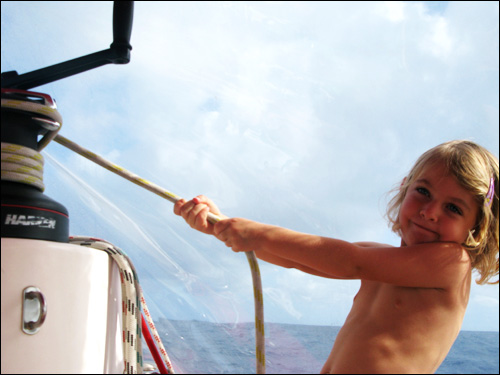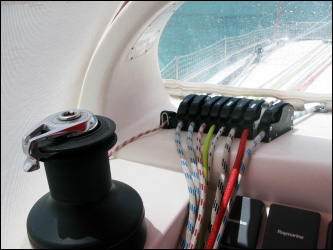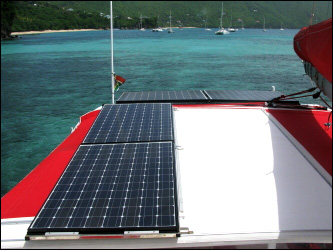Gregory:
 |
Never too young to help! |
 |
| Lines lead back to the electric winch at the helm |
1) I am a racing sailor at heart, so I wanted our cruising catamaran to sail at its best.
Folding props were fitted which possibly make the biggest difference in speed.
One electric winch at the steering position makes short-handed sailing a dream. Our kids can easily handle the spinnaker halyard, while I deal with the rest of the spinnaker stuff on the bow. All the main working ropes - such as both genoa sheets, the main halyard and the spinnaker halyard - lead back to this winch.
We have no winches on the mast, so time out of the safety of the cockpit is reduced.
Our spinnaker guys also lead back to the cockpit winches for easy control. Our main and spinnaker halyards have quality Harken blocks all the way, including at the top of the mast, as these are the two items that are pulled up a lot when cruising. The sails are of the best material available, which should result in the sails still having a perfect shape in 5 years time and being lighter to lift. Our symmetric and asymmetric spinnakers, with socks, are both used extensively.
Our mast section is a little larger, allowing us to get rid of the inner forestay, which makes tacking much easier.
Weight saving was always a focus, and weight was saved where possible. All our doors are made of the latest honeycomb cardboard construction that saves about 60% of the weight of a standard door. The inflatable has an aluminum hull made by AB which is one of the lightest for its size.
2) We wanted to charge with the motors as little as possible.
To enable this we fitted 210-amp quality alternators on each motor and installed 760 watts of solar panels.
 |
We installed 760 watts of solar panels |
The Sanyo solar panels are 190 watts each and operate at 110 volts which the Outback regulator brings down to 12 volts.
Every light in the boat including all navigation lights are LED lights, and in the saloon we have dimmers that when turned down only use 0.1 amp for 6 lights. So lights left on are not a stress for us. For water we went for the Spectra Newport 400 MKIV watermaker as this was the most efficient 12-volt unit on the market for the capacity we needed.
The solar panels will cover the power draw of the watermaker, fridge, two freezers, autopilot and full sailing instruments, and have extra for charging the batteries. This combination results in us not needing to charge with the motor on some days even with a 125L freezer and a fridge running full time.
3) We built in extra storage space so that we would have a place for things like toys, tools, spares, food, etc. Living with a family on a boat and doing ocean passages is very different from doing a one-week charter.
We feel that all these small changes make for an easier and more fun family sailing experience. |